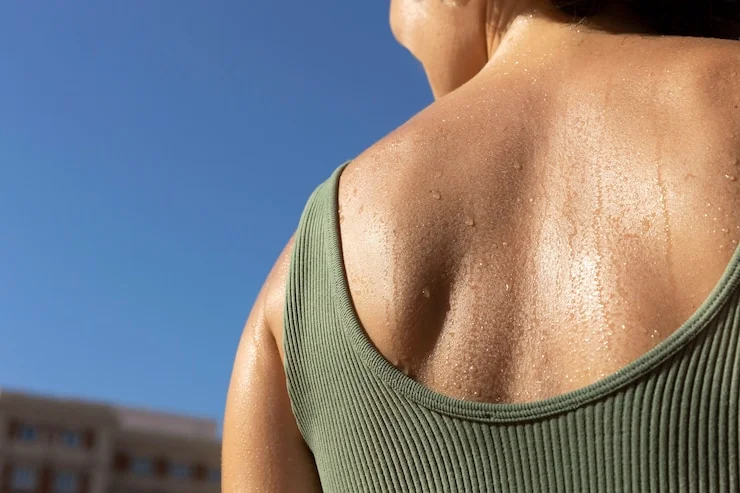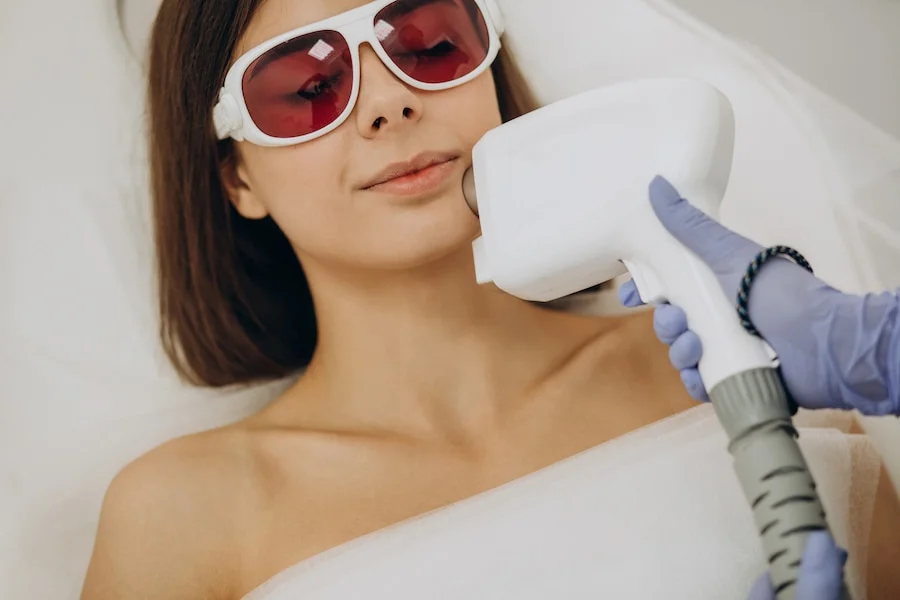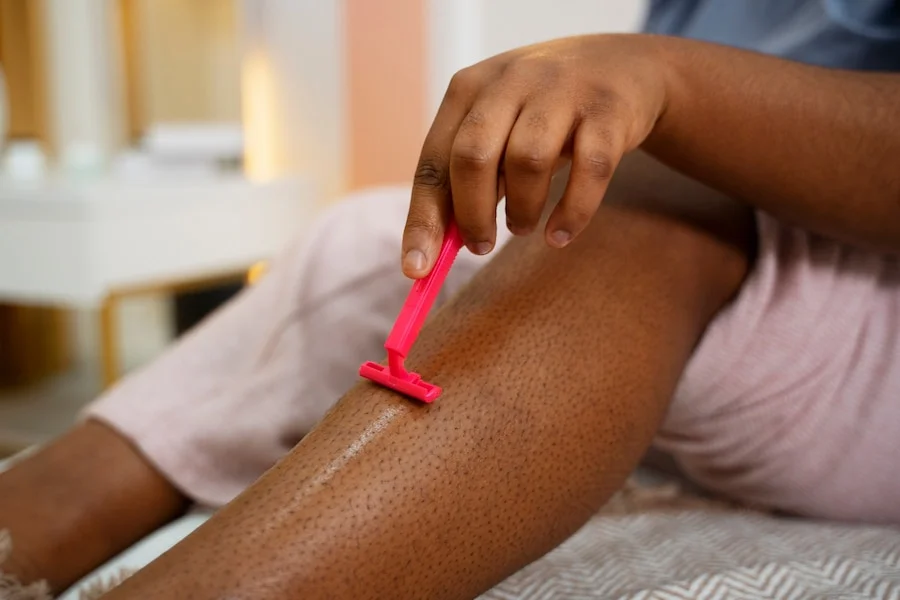When it comes to addressing sun-damaged skin, RF microneedling stands out as an effective treatment.
Sun exposure, known for causing photoaging, leads to premature wrinkles, loss of skin elasticity, and hyperpigmentation.
UVA and UVB rays penetrate the skin, causing both deep and surface-level damage. According to canada.ca, Skin cancer is the most common type of cancer. In Canada, about one out of three new cancer cases are skin cancer.
RF microneedling combines microneedling with radiofrequency energy to promote collagen production and repair sun-damaged skin, offering a promising solution for healthier, youthful skin.
In this article, we will delve deeper into the causes and types of sun damage, compare various treatment options, and explain why RF microneedling is an outstanding choice for those seeking to rejuvenate their sun-damaged skin and protect it from further damage.
Table of Contents
ToggleCauses & Effects of Sun Damage
Exposure to the sun’s ultraviolet (UV) rays can lead to various skin issues, including immediate sunburn and long-term damage known as photoaging.
Photoaging occurs when UV light penetrates unprotected skin, causing cellular damage that may not become visible for years.
This damage, also referred to as photodamage or solar damage, encompasses wrinkles, changes in pigmentation, loss of skin firmness, rough texture, and broken capillaries.
UV radiation disrupts the natural production of collagen and elastin in the skin, vital proteins responsible for maintaining its firmness and elasticity.
Over time, this disruption results in the formation of wrinkles, fine lines, and a reduction in skin suppleness.
Additionally, UV rays can stimulate the production of melanin, leading to uneven pigmentation and the development of sunspots.
Related: Understanding Sunburn: Types, Risks, Prevention and Treatment
Signs of A Sun-Damaged Skin
Different kinds of sun damage can happen to your skin when you spend too much time in the sun.
One common problem is wrinkles, those lines and creases you might notice as you get older. Most of these wrinkles actually come from sun exposure, not just from getting older.
The sun’s rays can also make blood vessels on your face get bigger, especially around your nose and cheeks, which can make your skin look red and spidery.
You might see brown spots too, like freckles or bigger tan spots, which aren’t from aging but from spending time in the sun.
Sometimes, your skin can get uneven in color, with dark patches or red spots, a condition called hyperpigmentation. Other issues include melasma, which causes dark patches on your cheeks, and blackheads from sun-damaged skin losing its elasticity.
Lastly, there’s poikiloderma. This is a skin condition where certain areas of the skin appear lighter or darker than usual, along with tiny blood vessels and thinning of the skin.
Poikiloderma of Civatte typically shows up on the chest or neck, showing red pigmentation that often comes from sun damage.
Related: Potenza™ RF Microneedling For Hyperpigmentation
Common Treatments for Sun-Damaged Skin
When it comes to fighting sun damage, there are many options, from home remedies to professional treatments. Over-the-counter creams with antioxidants like vitamin C and AHAs can slightly improve skin texture and tone.
Retinoids, available in different strengths, help reduce wrinkles and even out skin tone by speeding up skin cell turnover. However, these creams take time to show results and can sometimes irritate your skin.
For more specific treatments, medical professionals offer stronger options. Prescription creams can lighten dark spots, and stronger retinoids can make bigger improvements in wrinkles and texture. Chemical peels remove the top layer of skin, revealing smoother skin underneath.
Laser skin resurfacing is another effective treatment, using a laser to remove damaged skin cells and treat deep sun damage and wrinkles, though it requires significant healing time.
A better option for treating sun-damaged skin is RF Microneedling. This minimally invasive procedure combines microneedling, which makes tiny punctures to boost collagen, with radiofrequency energy.
Both laser skin resurfacing and RF microneedling eliminate old skin cells and stimulate collagen and new cell production, improving lines, wrinkles, scars, texture, tightening, pore size, discoloration, and stretch marks.
Microneedling can be used on both specific areas and the entire face, especially for darker skin tones.
Laser resurfacing is generally applied to facial problem areas, tackling advanced aging signs and is preferred for lighter skin tones, but it is more painful with longer downtime.
Ultherapy vs. RF Microneedling: Which is Right for Your Skin?
What is RF Microneedling?
RF Microneedling, also known as radiofrequency microneedling, has become a revolutionary treatment for sun damage. It combines the benefits of microneedling with radiofrequency (RF) energy to stimulate collagen production and rejuvenate the skin.
During the procedure, a handheld device with tiny needles creates controlled micro-channels in the skin. Dr. Lian Beauty utilizes Potenza RF Microneedling technology that allows for precise targeting of different skin depths.
This ensures optimal treatment for various sun damage concerns. Simultaneously, RF energy is delivered through these channels, gently heating the deeper layers of the skin.
The heat stimulation triggers the body’s natural healing response, further promoting collagen and elastin production.
Importantly, RF Microneedling is safe for all skin types, making it a versatile treatment option for the diverse skin tones in Canada in need of treatment from sun damage.
Benefits of RF Microneedling for Sun Damage
RF Microneedling offers numerous benefits for sun-damaged skin. Stimulating collagen production helps fill in wrinkles and fine lines, resulting in smoother, more even-textured skin.
The controlled micro-injuries and heat stimulation from RF energy can help break down and fade sunspots, leading to a more even skin tone.
Additionally, RF Microneedling triggers the body’s natural healing process, increasing collagen and elastin production, which plumps and tightens the skin.
This combination of effects makes RF Microneedling an excellent choice for improving skin texture, reducing hyperpigmentation, and enhancing overall skin health.
Related: Is RF Microneedling Better Than Microneedling For Glowing Skin?
Specific Sun Damage Areas Treated with RF Microneedling
RF Microneedling is an effective solution for sun damage on your face, addressing issues like wrinkles, fine lines, sunspots, and uneven skin tone. It can target specific areas such as your cheeks, nose, forehead, and under-eye circles.
Sun damage isn’t just limited to your face; it can affect your neck, chest, and arms too. RF Microneedling can improve texture, tone, and reduce sunspots in these areas as well.
In some cases, it can even help with sun damage on the scalp or legs. However, it’s important to consult with a professional to ensure it’s suitable for you.
The results of RF Microneedling for sun damage are gradual but long-lasting. You can expect to see continued improvement in your skin’s texture, tone, and elasticity for several months following treatment.
To maintain optimal results, a series of treatments spaced several weeks apart is often recommended. Dr. Lian Beauty can develop a personalized treatment plan to achieve your desired outcome.
Related: Potenza RF Microneedling For Stretch Marks Treatment
What to Expect During an RF Microneedling Session
A thorough consultation with a qualified medical professional will discuss your goals, medical history, and suitability for RF Microneedling.
They will also explain the procedure in detail and address any concerns you may have.
Preparation involves applying a topical numbing cream to the treatment area to minimize discomfort.
During the procedure, the doctor will use the RF Microneedling device to deliver precise microneedling with controlled RF energy to the targeted areas.
The needle depth and RF settings can be customized based on your individual needs and the severity of your sun damage. You may experience some mild discomfort or prickling during the procedure, but most patients find it very tolerable.
After the treatment, you may experience some redness, swelling, and mild sensitivity in the treated area. These effects typically subside within a few days. Your provider or medical aesthestician will provide specific post-treatment care instructions to optimize healing and results.
Microneedling is a completely safe procedure, even during the summer. After the treatment, your skin may be red and bruised for a few days, which is normal.
To ensure a smooth recovery, avoid touching your face for a few hours, and steer clear of sun exposure for at least three days. It’s best to schedule your microneedling procedure when you don’t have events requiring sun exposure.
Use a barrier repair moisturizer on your face, and when you go outside, wear a hat and sunscreen to protect your skin.
By following these guidelines and avoiding sunlight for the first few days, you’ll heal quickly and effectively.
After this initial recovery period, you can resume all your daily activities, show off your rejuvenated skin, and enjoy the summer sun.
Related: What is Potenza RF Microneedling: The Secret To Flawless Skin
Post-Treatment Care
Following your RF Microneedling treatment, proper aftercare is crucial for optimal results and healing.
Your provider will give you specific instructions, which may include avoiding sun exposure, using sunscreen daily, and keeping the treated area clean and moisturized.
Maintaining a consistent skincare routine with sun protection is essential to prevent further sun damage and preserve the results of your RF Microneedling treatment.
Conclusion
Sun damage can be a concern for many Canadian residents. Fortunately, effective solutions like RF Microneedling exist to restore a youthful and healthy glow to your skin.
RF Microneedling offers a safe, non-surgical approach to address wrinkles, sunspots, and uneven skin tone caused by sun exposure.
If you’re considering RF Microneedling for sun damage, feel free to contact our medical aesthetic clinic in Limoges, Ontario to discuss your specific needs and determine if this treatment is right for you.

Dr. Lian Peter, MD, MPH, CCFP, is a Family physician with a passion for aesthetics. In her aesthetic clinic, she provides a wide range of minimally invasive and non-invasive procedures, constantly honing her skills to deliver exceptional care and help patients attain their desired appearance.






